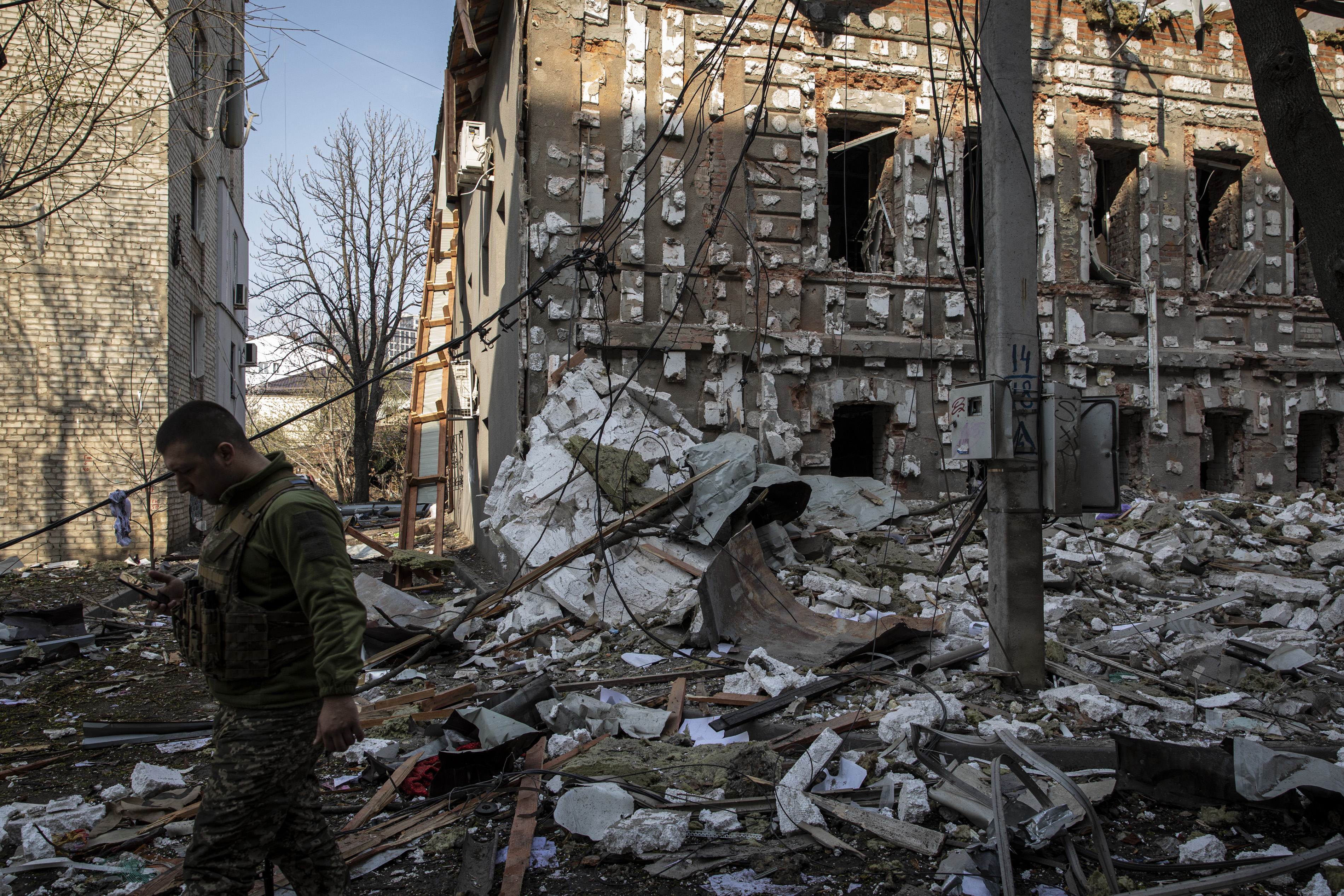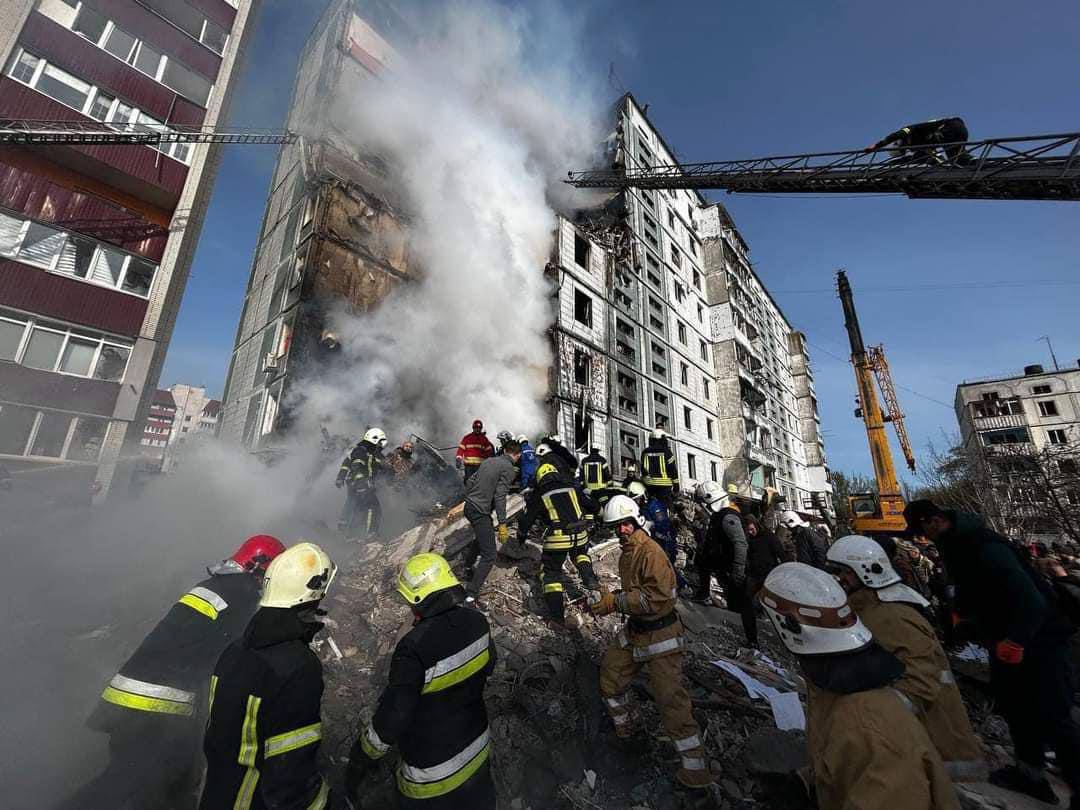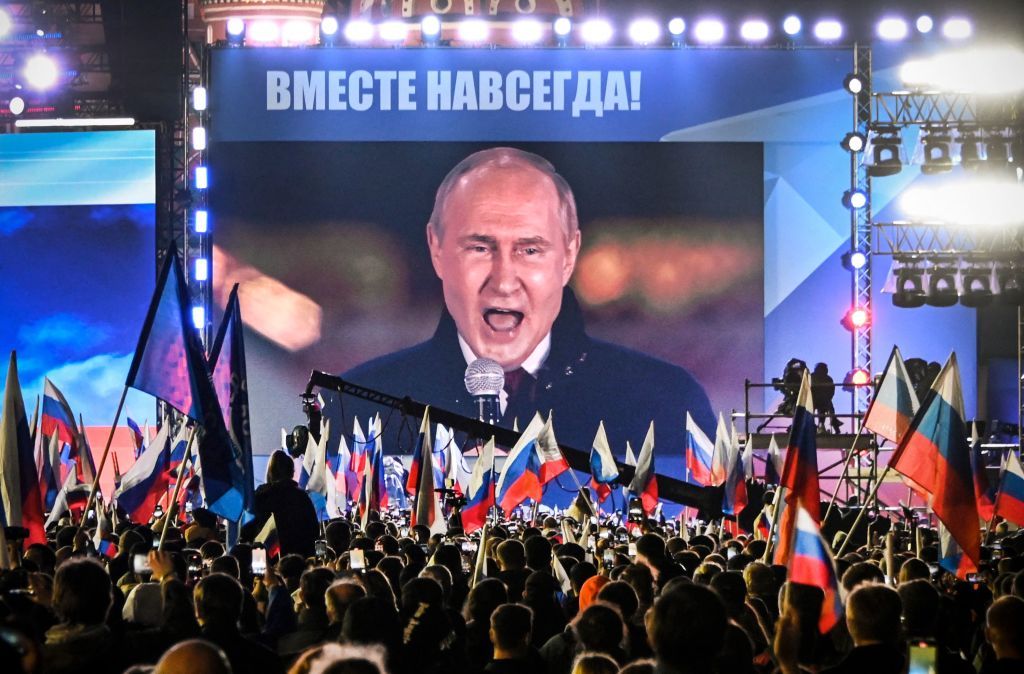Kate Tsurkan: One war, multitudes of pain

Editor’s Note: The opinions expressed in the op-ed section are those of the authors and do not purport to reflect the views of the Kyiv Independent.
One of the first things I noticed in Kharkiv, besides the boarded-up windows and shrapnel holes in the sidewalks, were the street signs reminding people about the threat of mines. It was a stark contrast to the city that I had once known – Kharkiv transformed into a defiant frontline city.
Coming from Chernivtsi, a city located in western Ukraine which has lived in relative peace since Feb. 24, 2022, I initially wasn’t sure what to expect during my time there.
Five years ago, when I told my friends and acquaintances in western Ukraine that I wanted to visit Kharkiv for the first time, many of them said, "Why? It's so far away. You're better off going to Poland instead."
Since the start of the full-scale invasion, those same people have confided in me that they regret not having traveled to eastern Ukraine when they had a chance. Russia’s all-out war has altered our perspective on many things.
There is still a chance to travel to much of the east, including Kharkiv, thanks to the Ukrainian military. I had no doubt in my mind that I would return to Kharkiv as soon as the situation there became more stable.
Meanwhile, those same people who expressed their regret at never having traveled to cities like Kharkiv responded with the same skepticism, just phrased differently: “Why are you going back there? It’s so dangerous. You’re better off staying at home where it’s safe!”
Due to its proximity to the Russian border, Kharkiv Oblast is subject to near daily attacks. The day before my cross-country train ride, Russia launched S-300 missiles at the city, and I had a moment where I asked myself if I was making the right decision.
I went anyway, and I’m thankful that I did. I traveled to Kharkiv to take part in a weeklong literary residency at the Slovo (“Word”) building. This historic building was once home to some of Ukraine's most talented young artists who were systematically targeted, imprisoned, and killed during the Stalinist purges in the 1930s.
Known today as the "Executed Renaissance,” this group represents nearly an entire generation of brilliant minds lost to Russian aggression. The literary residency allows artists to come to Kharkiv, live in the Slovo building, create, and pay their respects to their predecessors as a means of healing generational wounds.
After my first night in Kharkiv, the messages from people back in western Ukraine were all the same: “Were you able to sleep through the sounds of explosions? Is there a proper shelter near your apartment?”
I was fortunate that Russia didn’t attack the city while I was there, although it did target cities and villages closer to the border. I dutifully replied to the messages I received from back home, explaining that life was carrying on in Kharkiv as best it could.
“Even the cat café is packed with clientele!” I added. Many people have returned to the city, businesses are steadily resuming work, and there is a glimmer of typical city life following the successful Ukrainian counteroffensive last September.

However, this “new normal” in Kharkiv has no comparison to be found in peaceful times and the atmosphere of the city will never fully return after everything that has transpired – nor will it anywhere else in Ukraine.
The people of Kharkiv, no matter their background, all have one thing in common: they are thankful to be alive. They are also immensely proud to call Kharkiv home, as evidenced by how pristine the city looks, even with the traces of war visible at every turn.
Some of the Kharkivites I met fled to western Ukraine during the first terrifying weeks of the full-scale invasion, while others remained the entire time. It was difficult to hold back my tears listening to one woman calmly describe what it was like being caught on the street during Russian shelling and how her first reaction was, “Well, I’ve lived a long life…” before her survival instincts kicked in.
One man told me about the fear that gripped him as he saw Russian tanks rolling down the street, and his uncertainty as he boarded a train to Lviv, wondering if he would ever be able to return home. Another woman told me with a dreamy smile about the pure bliss she’d experienced going to a café for the first time after everything started and having the chance to almost feel normal again.

On one of my last days in Kharkiv, I traveled to a village where a friend’s elderly mother stubbornly, yet bravely, lives alone, and she told me about her childhood spent in Belarus during World War II. According to her, the sounds of Russian missiles were even louder and more frightening than the Nazi bombardments she’d heard back then.
We sat in her kitchen talking for several hours, and when light rainfall outside transitioned into a thunderstorm, she jumped, startled by the sounds. As I reassured her that it was just the weather, I understood that the hate and anger I felt toward Russia did not, in fact, have a limit.
I would typically make my way home in a daze after all these meetings and then burst into tears upon arriving back at the Slovo building. How could I discuss Russia’s all-out war, as I had in my work for the past year, when the reality in Chernivtsi was so different?
We’d lived with mass blackouts all winter due to Russian missile strikes on Ukraine’s energy infrastructure, but how did sitting in the dark in Chernivtsi measure up to Saltivka, one of Kharkiv’s largest residential areas, being reduced to rubble?
I realized that I, like so many other people, was suffering from survivor’s guilt. For a while, I wasn’t quite sure how to handle it.
Ultimately, those who have been in places like Chernivtsi since the beginning of Russia's all-out war will never fully comprehend what it’s like being caught in the midst of shelling or witnessing enemy tanks rolling down their streets – and that’s a good thing. I hope and pray we will never have to experience it.
This doesn’t lessen the suffering of those in Chernivtsi whose loved ones are currently fighting in eastern Ukraine, including Bakhmut, or the shudder felt upon hearing the wail of yet another air raid siren in the middle of the night.
Soldiers from Chernivtsi Oblast were killed while trying to hold Mariupol, Melitopol, and other cities currently under Russian occupation. Chernivtsi Oblast’s official social media channels also feature weekly – sometimes daily – announcements of soldiers’ funerals.
The war is here but not here, forever circling us, forever taunting us with the promise of more death.
Chernivtsi, Ukraine's smallest oblast, has also become a safe haven for tens of thousands of refugees fleeing from Russian attacks. Some internally-displaced Ukrainians still call Chernivtsi home, enrolled in schools, set up businesses, and think about their future here – at least, for as long as the war continues. Others say that they are slowly resettling in Kharkiv and other oblasts where the situation has more or less improved. Home is home, after all.

Everyone in Ukraine is living through one war – a brutal, inhumane war – that is defined by multitudes of pain. Those of us who manage to survive will hopefully someday find the right words to not only describe but process it.
The longer the war continues, however, the more we will inevitably have to remind ourselves that we all have the same obligation: we must ask ourselves daily what we are doing to bring Ukraine one step closer to victory. If it is not fighting on the frontlines, the most vital and pressing of tasks facing us now, then it is most often what we can do to ease soldiers’ burdens.
That’s why it’s essential for people in areas of the country that do not live with the daily threat of missile and drone strikes to take that survivor’s guilt or bouts of denial and transform it into something useful.
The mother who fled with her infant child at the start of the invasion and donates to Come Back Alive whenever she reads the news and feels hopeless –
The foreigner who quietly went through the rigorous process of joining the Ukrainian Armed Forces as a combat medic –
The volunteer worker in Chernivtsi who hands out cups of hot tea and bowls of soup to tired refugees from the east –
The IT specialist who put his career on hold to defend his country against Russian aggression –
Each and every person who carries Ukraine in their heart, no matter where they are located, is making their own unique contributions to and sacrifices in the name of Ukrainian victory.













